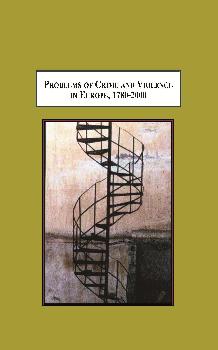This is our backup site. Click here to visit our main site at MellenPress.com
Problems of Crime and Violence in Europe, 1780-2000. Essays in Criminal Justice

| Author: | Avdela, Efi, Shani D’Cruze and Judith Rowbotham | |
| Year: | 2010 | |
| Pages: | 372 | |
| ISBN: | 0-7734-3815-7 978-0-7734-3815-6 | |
| Price: | $239.95 | |
This work makes available historical and anthropological research on a region comparatively little known to the English-language academic readership interested in the lively field of crime and violence history.
The volume challenges the largely evolutionary current conceptualizations (in terms of both chronology and geography) which shape much of the history of European crime and interpersonal violence.
The volume challenges the largely evolutionary current conceptualizations (in terms of both chronology and geography) which shape much of the history of European crime and interpersonal violence.
Reviews
“Taken together, this research suggests a non-linear, non-evolutionary, and more complicated framework for analyzing the history of European violence during the last two centuries. The essays in this volume focus less on quantitative trends in violence than on the complex process through different groups in different places defined criminality and understood violence, and the contributors’ interpretations offer not so much an attack on the civilizing process model as a more sophisticated set of explanations for changing patterns of criminal violence. By reframing the social construction of criminality from the perspective of the Greek countryside and subaltern society, [this work] opens new pathways for understanding both the history of European violence and the history of state formation.”
– Prof. Jeffrey S. Adler, University of Florida
“[T]he implications of this collection are very important for students of violence, crime, state formation, and the formation of modern culture generally. They have not set out to topple Elias, but to recognize nuances and exceptions that make the “civilizing process” more complex.” – Prof. Wilbur Miller, SUNY at Stony Brook
“[T]he implications of this collection are very important for students of violence, crime, state formation, and the formation of modern culture generally. They have not set out to topple Elias, but to recognize nuances and exceptions that make the “civilizing process” more complex.” – Prof. Wilbur Miller, SUNY at Stony Brook
Table of Contents
Foreword
by Professor Jeffrey S. Adler
Introduction: de-centring violence history-
Efi Avdela (University of Crete), Shani D’ Cruze (Keele University), Judith Rowbotham (Nottingham Trent University)
Modern states, modern subjectivities: A legacy of conflict? The ‘brutalised veteran’ and violence in Europe after the Great War -
Clive Emsley (Open University)
When ‘men of honour’ met ‘men of law’: ritualised violence, the unwritten law and modern criminal justice -
Thomas Gallant (University of California San Diego)
Putting up (with) the system: The Christian Orthodox family in crisis: the Ecumenical Patriarchate’s courts and the reconstruction of the privatesphere in southeast Europe in the nineteenth and early-twentieth centuries -
Dimitris Stamatopoulos (University of Macedonia)
Network technologies: the implementation of new identification technologies at the turn of the century -
Peter Becker (Johannes-Kepler-Universitat Linz)
Interactions between citizens, government and justice: norms, practices and values of the liberal judicial model during the late French Revolution (1795-1801) -
Emmanuel Berger (Université de Louvain)
Negotiating marginalities: Women and banditry in Provence after the French Revolution -
Karine Lambert (Université de Nice)
Powerful subjects in the margins of the state -
Urania Astrinaki (Panteion University)
‘The most troublesome woman in Crewe’: investigating gender, sentencing and the late Victorian English lower courts -
Shani D’Cruze, Barry Godfrey and David Cox (Keele University)
Fragile masculinities: Making sense of ‘hideous crimes’: homicide and the cultural reordering of gendered sociality in Post-Civil-War Greece -
Efi Avdela (University of Crete)
Who is the ‘rapist’?: crimes of sexual violence and theories of evolution -
Joanna Bourke (Birkbeck College, London University)
Index
by Professor Jeffrey S. Adler
Introduction: de-centring violence history-
Efi Avdela (University of Crete), Shani D’ Cruze (Keele University), Judith Rowbotham (Nottingham Trent University)
Modern states, modern subjectivities: A legacy of conflict? The ‘brutalised veteran’ and violence in Europe after the Great War -
Clive Emsley (Open University)
When ‘men of honour’ met ‘men of law’: ritualised violence, the unwritten law and modern criminal justice -
Thomas Gallant (University of California San Diego)
Putting up (with) the system: The Christian Orthodox family in crisis: the Ecumenical Patriarchate’s courts and the reconstruction of the privatesphere in southeast Europe in the nineteenth and early-twentieth centuries -
Dimitris Stamatopoulos (University of Macedonia)
Network technologies: the implementation of new identification technologies at the turn of the century -
Peter Becker (Johannes-Kepler-Universitat Linz)
Interactions between citizens, government and justice: norms, practices and values of the liberal judicial model during the late French Revolution (1795-1801) -
Emmanuel Berger (Université de Louvain)
Negotiating marginalities: Women and banditry in Provence after the French Revolution -
Karine Lambert (Université de Nice)
Powerful subjects in the margins of the state -
Urania Astrinaki (Panteion University)
‘The most troublesome woman in Crewe’: investigating gender, sentencing and the late Victorian English lower courts -
Shani D’Cruze, Barry Godfrey and David Cox (Keele University)
Fragile masculinities: Making sense of ‘hideous crimes’: homicide and the cultural reordering of gendered sociality in Post-Civil-War Greece -
Efi Avdela (University of Crete)
Who is the ‘rapist’?: crimes of sexual violence and theories of evolution -
Joanna Bourke (Birkbeck College, London University)
Index
